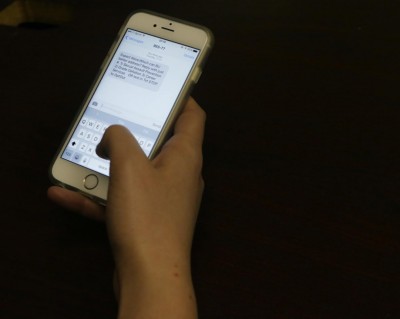
The “Expect More” campaign, a text-based survey that aims to gather Boston University students’ feedback, sent its first text to the student body Wednesday and allowed students to vote on issues the BU administration can better address.
The campaign sent students a text message that listed issues such as sexual assault prevention, grade deflation and career services, and students voted for which issue they thought BU could address more adequately by replying to the text. The campaign runs under a standing committee chartered Apr. 6, 2015 by the BU Student Government Senate, The Daily Free Press reported Apr. 7.
“Grade deflation won by an overwhelming margin, receiving nearly 60 percent of the vote,” Robbie Brussell, chairman of the committee, wrote in an email. The committee aims to use the results of this survey to work with the administration to address issues students feel should be prioritized.
“We really hope that we can use this platform going forward to spur tangible change on campus,” Brussell, a senior in the Questrom School of Business, wrote. “To go to administration with quantifiable data about what the student body actually wants … goes a long way in improving students’ quality of life on campus.”
Ari Betof, the head of school at BU Academy, said combatting issues of grade inequity is important for school at any level.
“Every school needs to think about grade equity and fairness,” he said. “We are a school and need to think about this, but we do not have specific questions to address grade deflation. It’s an important question for the university to be thinking about.”
According to Brussell, the committee was pleased with the amount of student participation in the survey.
“In order to have a statistically significant sample size for a 16,000 undergraduate student population, we needed roughly 375 student responses to have a 5-percent margin of error,” Brussell wrote. “We have received over 475 responses, nearly 25 percent of our contact database. That gives us a margin of error of about 4.5 percent.”
The campaign utilized a texting software service to be able to send thousands of messages at once, according to Brussell. It took about one year to authorize the service agreement, which caused the delayed launch.
Katherine Hasenauer Cornetta, the assistant to the dean of students, stated that the program’s delay resulted from a long period of software examination.
“Obtaining the software had many steps, mainly because many parties wanted to make sure it was the correct fit,” Cornetta wrote in an email. “There are also always privacy concerns (what would this software company do with the phone numbers that opt-into the system, for example.)”
The committee currently has approximately 2,200 student phone numbers in its database, according to Brussell. Those who received texts were students who consented to providing their number during care package deliveries sponsored by SG in the spring 2015 semester and a program that provided students free food truck coupons with each phone number given, The Daily Free Press reported Mar. 3, 2015.
Several students said expanding the program to the entire student body would allow it to be an effective method of public expression.
Yesennia Pinkley, a junior in the Metropolitan College, said the program allows students to openly express their criticism of the administration, and as many students as possible should take advantage of the opportunity.
“It’s a pretty direct way to reach the administration, so it’s easy for people to respond [with] what they think is important and to remain anonymous,” she said. “If there was some kind of advertisement — ‘This is how you can get your voice heard’ — I think a lot of people would probably take that up.”
Fred Chang, a junior in the School of Hospitality Administration, said the survey is helpful because it provides a look into what the BU community is thinking about.
“It’s interesting because … you can get an idea [of] what’s the biggest issue in the view of BU, but maybe next time, just give us a heads up,” he said. “When you get a text from an unknown number, it turns up as very random and awkward and an intrusion of privacy.”
Tatiana Diaz-Gallegos, a sophomore in the College of Engineering, said she wished she knew more about the initiative.
“The options that they presented don’t seem related,” she said. “[The committee] should advertise it more, probably have more events or some posters around because I’ve never seen anything at all about it, which is kind of disappointing.”






















































































































